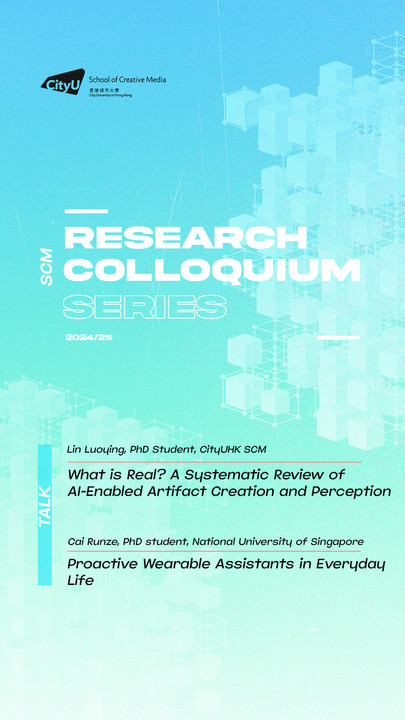4th SCM Research Colloquium 2024/25
Seminar
21 Jan 2025
3:30 p.m – 5:30 p.m
M6050 Screening Room 1, Level 6, Run Run Shaw Creative Media Centre
Free Admission
|

|
The SCM Research Colloquium takes place approximately once a month for taught postgraduate, graduate students, faculty and professionals from creative media and other related disciplines to present their recent research topic/project. The colloquium offers a great opportunity for ideas exchange and intellectual conversations about one’s work. Each session will feature two speakers, a graduate student/guest speaker and a faculty member.
Each presentation is about 30 minutes, followed by 15 minutes open discussion. Seminar introduction and Q&A will be hosted by Prof. Espen Aarseth or Prof. Richard Allen. No registration is needed and light refreshments are provided.
Seminar 4
21 January 2025, 3:30 p.m – 5:30 p.m
Lin Luoying (PhD student) -
What is Real? A Systematic Review of AI-Enabled Artifact Creation and Perception
Throughout history, it has been human nature to express ourselves through imitation, reproduction, and the collective shaping of truth. This talk explores how Generative AI technologies amplify and transform these fundamental tendencies, reshaping the boundaries between fact and fiction in our digital landscapes.
Through a systematic literature review, I will outline the framework and research landscape regarding their impact on our understanding of reality and authenticity. We will discuss the challenges and opportunities that arise from our enhanced capabilities in creation and reproduction, emphasizing the need for responsible coexistence with GenAI. Join me as we navigate the complexities of this evolving relationship between humanity and technology, envisioning a future where both can thrive.
Cai Runze (PhD student at the National University of Singapore) -
Proactive Wearable Assistants in Everyday Life
As mobile computing evolves, our interactions with digital technology have become deeply integrated into daily life, often at the cost of increased cognitive load and distraction. Wearable AI assistants, powered by augmented reality (AR) smart glasses, offer a transformative solution to this challenge. By proactively analyzing user attention and environmental context, these systems deliver seamless, personalized assistance, enhancing productivity and fostering curiosity.
In this talk, we will explore the vision and design of proactive wearable AI systems through two examples: PANDALens, an AI assistant designed for documenting daily activities, and AiGet, a knowledge discovery tool that transforms everyday moments into learning opportunities. We will discuss the high-level principles behind wearable AI and demonstrate how these innovations minimize user effort while enriching everyday experiences. Together, these systems highlight a shift toward intelligent, unobtrusive companions that integrate harmoniously with our natural workflows and aspirations.